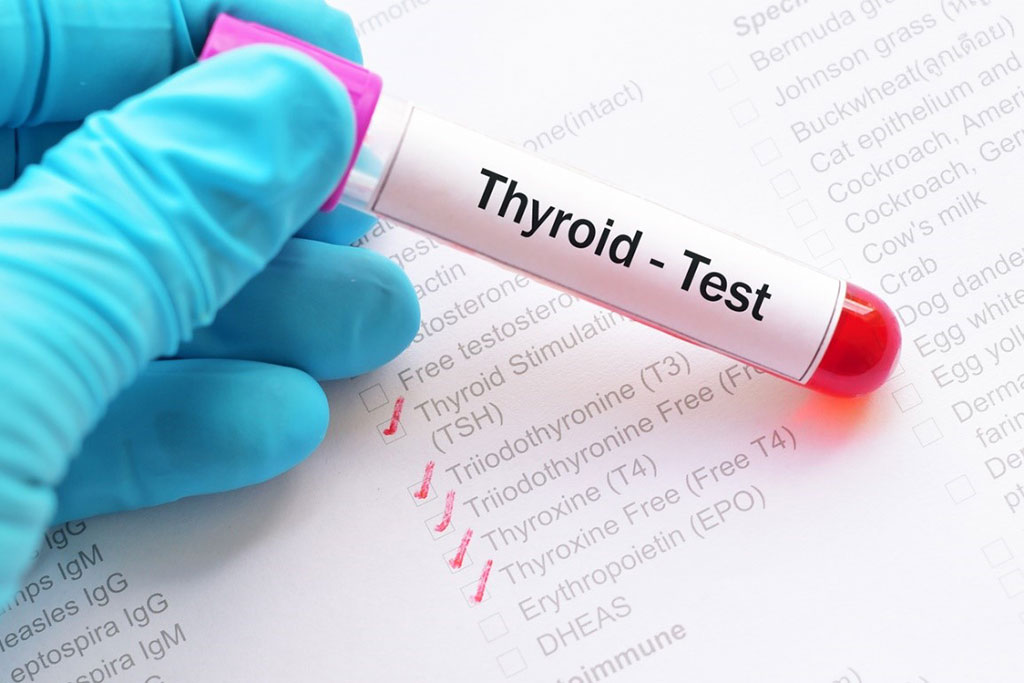Pregnancy TSH Variations Prompt Erroneous Thyroid Disease Diagnosis
By LabMedica International staff writers
Posted on 22 Jun 2020
Thyroid-stimulating hormone is a pituitary hormone that stimulates the thyroid gland to produce thyroxine, and then triiodothyronine which stimulates the metabolism of almost every tissue in the body.Posted on 22 Jun 2020
Physiologic variations in thyroid-stimulating hormone (TSH) concentrations may lead to a misclassification of subclinical thyroid disease for some healthy pregnant women, possibly subjecting women to unnecessary treatment.

Image: Thyroid-stimulating hormone variations in pregnancy may prompt erroneous subclinical thyroid disease diagnosis (Photo courtesy of HealthEngine).
Endocrinologists at the Medical University of Lodz (Rzgowska, Poland) and their colleagues assessed baseline concentrations of free T4, free T3, as well as TSH at 30 minute intervals (between 7.00 and 9.00 hours) in 110 healthy pregnant women, age 30.2 ± 6.0 years, 9.9 ± 2.4 weeks of gestation and in 19 female controls age 28.9 ± 10.7. The scientists analyzed data from the healthy pregnant women (mean age, 30 years; mean BMI, 24.9 kg/m²; mean gestational age, 9.9 weeks), hospitalized at Polish Mother’s Memorial Hospital Research Institute between 2017 and 2019, as well as the non-pregnant healthy women (mean age, 29 years; mean BMI, 28.3 kg/m²).
Based on data from 550 measurements, the team found that mean TSH concentrations were 1.62 mIU/L and 1.67 mIU/L among pregnant women and controls, respectively. Women who were Thyroid peroxidase (TPO) antibody-positive had a higher TSH concentration versus women who were TPO antibody-negative (mean TSH, 3.17 mIU/L versus 1.62 mIU/L). Taking into account the highest TSH out of five consecutive measurements, the scientists found that 20.9% of pregnant women had a TSH measurement greater than 2.5 mIU/L and 9.1% of pregnant women had a TSH measurement greater than 4 mIU/L.
When considering the lowest TSH value, the investigators observed TSH measurements greater than 2.5 mIU/L in 12.7% of pregnant women and TSH measurements greater than 4 mIU/L in 3.6% of pregnant women. The team found that the discrepancy was even greater for women who were TPO antibody-negative, varying between 21.2% versus 8.1% for a TSH greater than 2.5 mIU/L when considering the highest versus. the lowest TSH values, and varying between 6.06% versus 1.01% for a TSH greater than 4 mIU/L when considering the highest versus the lowest TSH values. They also found that TSH concentrations varied by 39.5% for pregnant women and by 42.47% among controls, with no between-group difference.
Andrzej Lewinski, MD, PhD, a Professor of Endocrinology and the senior author of the study, said, “Any decisions to instigate treatment, particularly during such a sensitive period like pregnancy, should be based on clear data that define what TSH and thyroid hormone concentrations are abnormal, as well as evidence of definite benefit of treatment. Furthermore, assessment of thyroid function should be performed during the first trimester of pregnancy, as fetal development is then almost entirely dependent on maternal thyroid hormone concentrations. In such circumstances, it is mandatory to ascertain that one is dealing with a genuine abnormality and not with physiological variations in hormone concentrations.” The study was published on May 19, 2020 in the journal Clinical Endocrinology.
Related Links:
Medical University of Lodz








 (3) (1).png)




